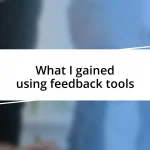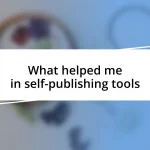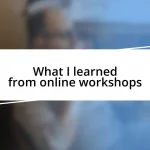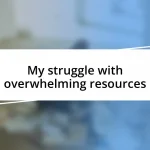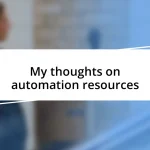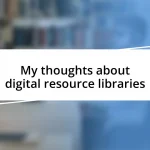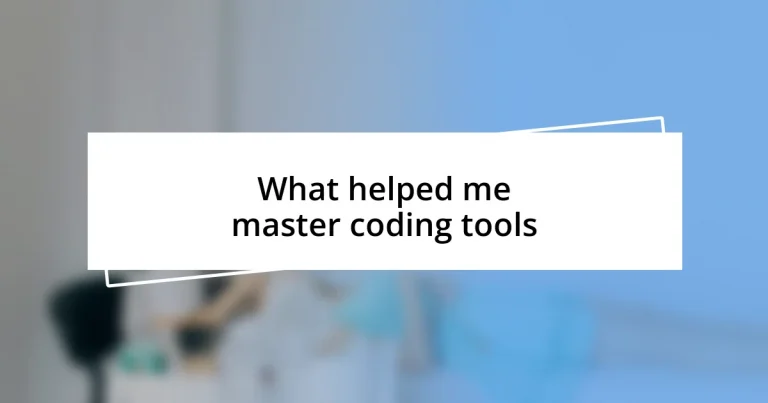Key takeaways:
- Mastering coding tools like Git and IDEs transformed collaboration and project management, enhancing confidence and workflow.
- Identifying personal learning styles—such as visual aids, hands-on practice, and peer discussions—greatly improved coding comprehension and retention.
- Engaging in real projects and actively seeking feedback fostered practical skills and resilience, solidifying knowledge beyond theoretical understanding.
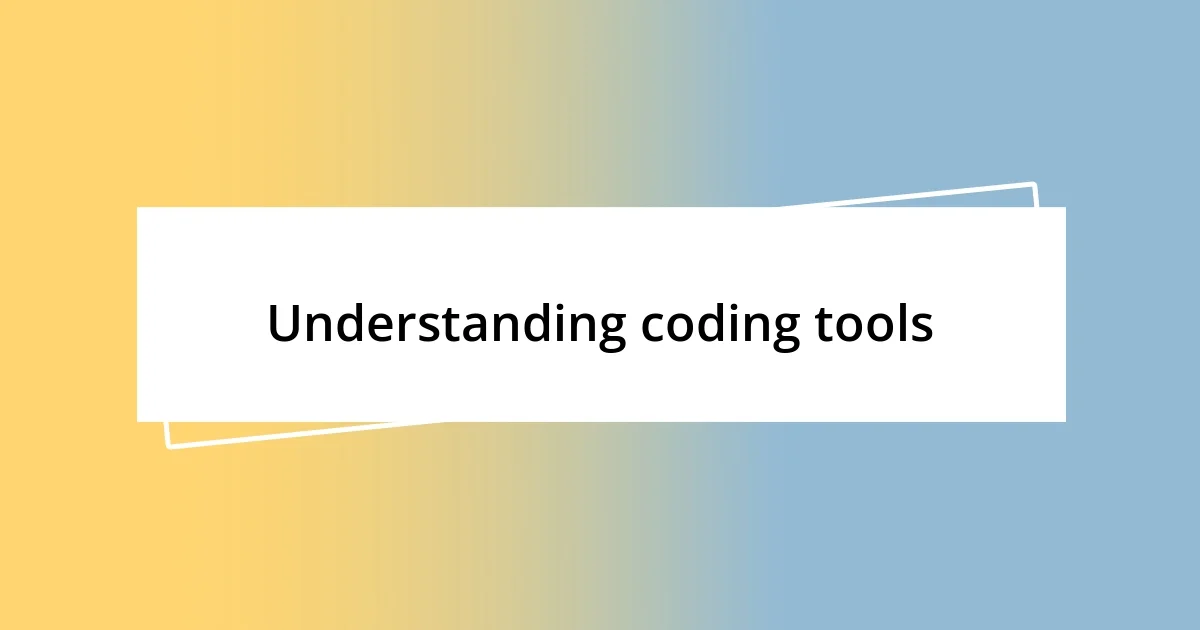
Understanding coding tools
When I first started coding, the sheer number of tools available felt overwhelming. I remember staring at lists of IDEs, text editors, and debugging tools, wondering where to begin. Each tool seemed to promise success, but it wasn’t until I actually experimented with them that I began to understand their true value and how they could enhance my workflow.
One pivotal moment for me was discovering version control systems like Git. Initially, I found it confusing—code repositories, branching, merging—what did all that mean? But once I took the time to play around with it, I realized how crucial it was for collaboration and maintaining my code history. It was like finding an anchor in the stormy sea of coding; suddenly, I felt more in control and confident about my projects.
Have you ever worked on a team project where communication fell apart? That’s exactly what happened to me before I found the right coding tools. I learned that having the right environment, like IDEs with built-in collaboration features, not only made coding easier but also fostered a sense of unity among teammates. I can’t stress enough the difference it made in turning chaos into productive teamwork.
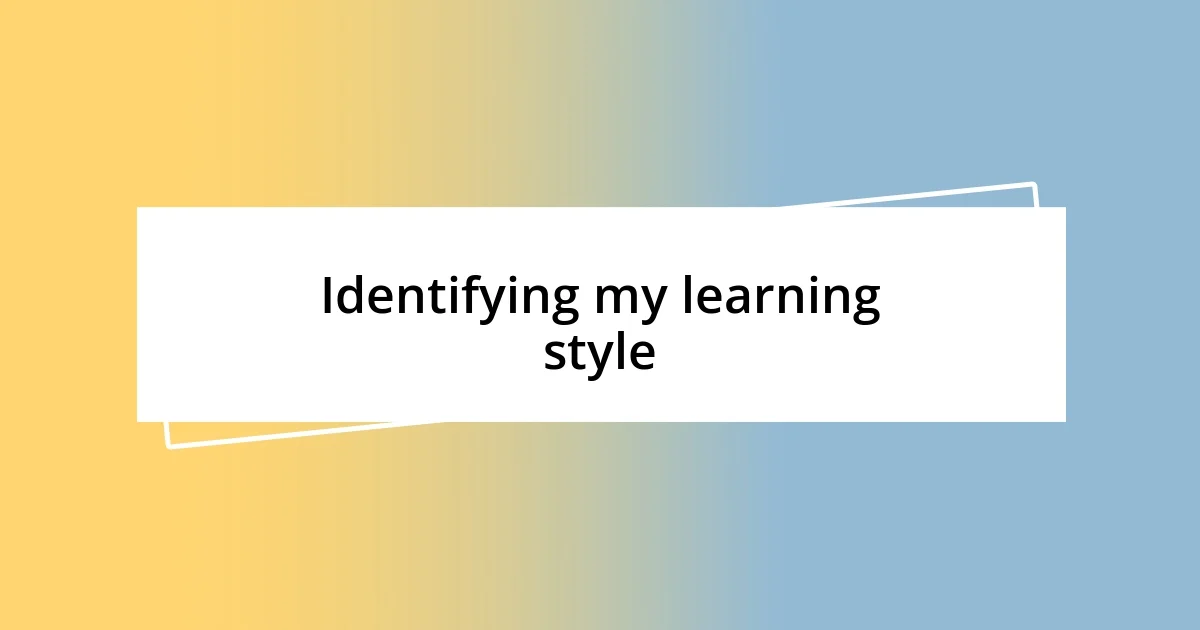
Identifying my learning style
Identifying my learning style was a revelation that profoundly impacted my coding journey. I realized early on that I absorb information differently than most people. While some can passively listen to lectures, I found that actively engaging with material—like coding along with a video or writing out notes—helped me internalize concepts more effectively.
To pinpoint my preferred method of learning, I experimented with various approaches. Here’s what I discovered worked best for me:
- Visual Learning: I thrive on diagrams and illustrations. Seeing how different coding structures interact visually helps me grasp complex ideas.
- Hands-On Practice: Nothing beats trial and error. I would often test out snippets of code to see the real-time effects of changes I made.
- Discussion with Peers: Talking through problems with friends or fellow coders clarifies my understanding and solidifies my grasp on tricky topics.
Tracking these moments of clarity provided me with the insight I needed to tailor my study habits, which made all the difference in my coding proficiency.
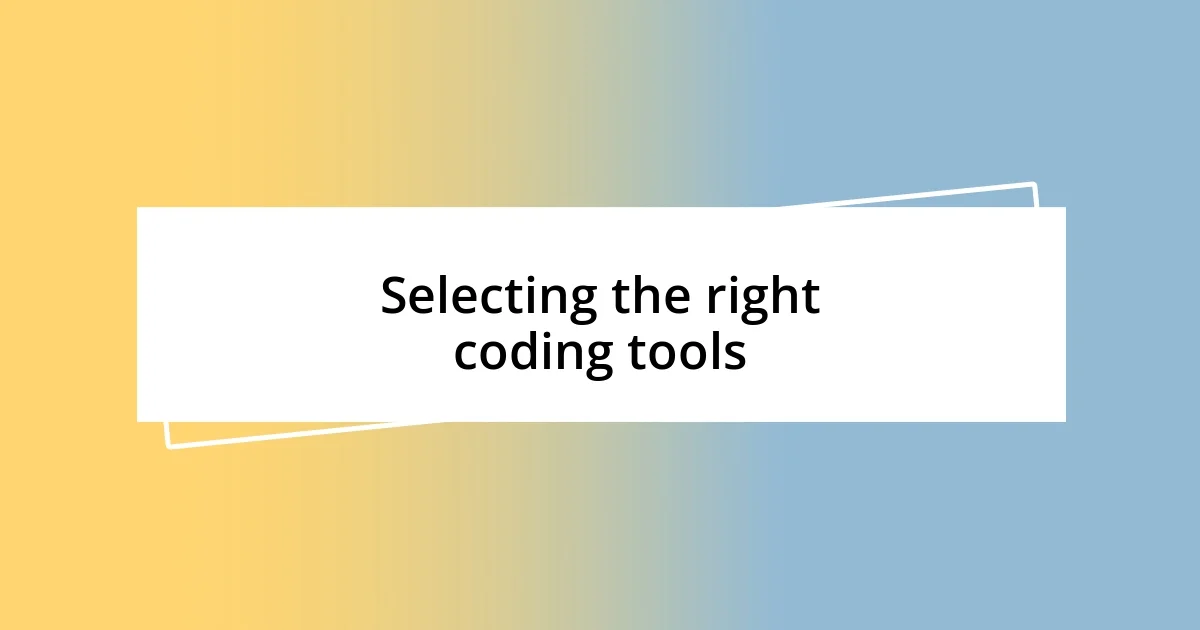
Selecting the right coding tools
Selecting the right coding tools can be a game changer in your programming experience. I remember when I was trying to choose between different IDEs. It felt like picking a favorite flavor of ice cream; each option had its unique strengths. Eventually, I realized that my choice should align with my specific needs, like whether I prioritized debugging tools or a simple interface that wouldn’t distract me.
Making comparisons can clarify what each tool offers. For instance, I once flipped back and forth between Visual Studio Code and Sublime Text. With Visual Studio Code, I found extensions that enhanced my workflow, while Sublime Text offered speed that I truly appreciated when working with larger files. Each tool had its own merits, but knowing my coding habits directed me toward the best fit for my projects.
I also discovered that community support significantly influenced my selection process. When I faced hurdles, being part of forums and user groups made navigating challenges easier. Having access to a wealth of shared knowledge helped me overcome roadblocks quickly. So, consider not just the tools themselves, but also the ecosystems surrounding them as you make your choice.
| Tool | Main Features |
|---|---|
| Visual Studio Code | Extensions, debugging tools, integrated terminal |
| Sublime Text | Speed, simplicity, customizable shortcuts |
| Atom | Collaboration features, open-source, hackable |
| JetBrains IDEs | Advanced code analysis, productivity boosters |
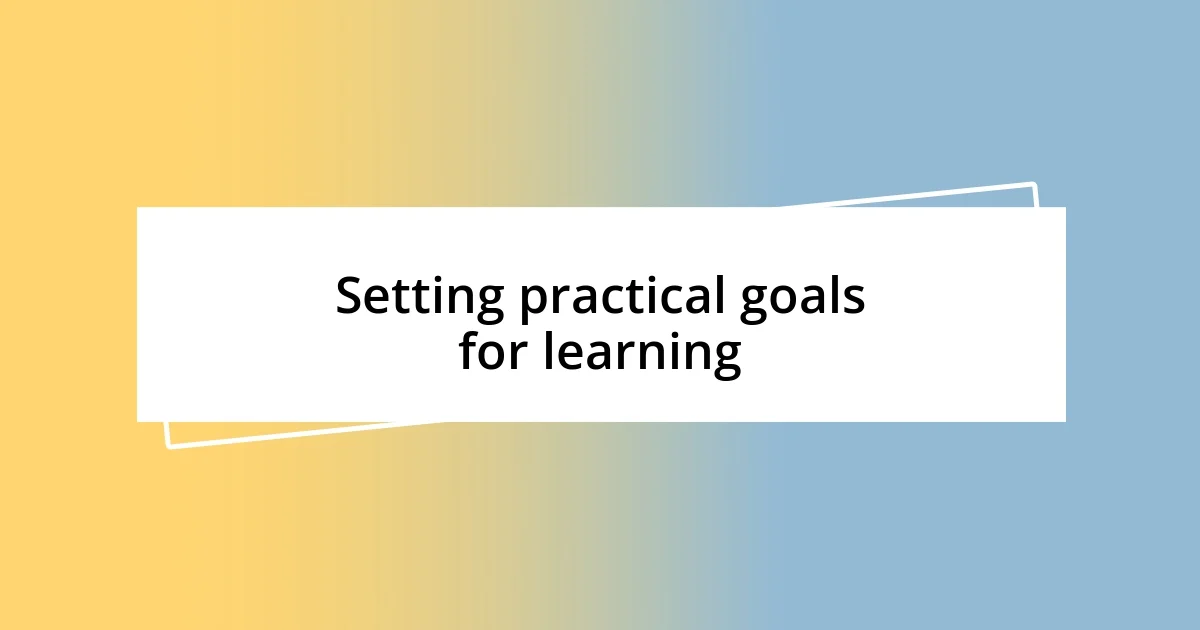
Setting practical goals for learning
Setting practical goals for learning is essential in navigating the vast field of coding. I vividly remember when I set my first goal to complete a beginner’s tutorial in just one week. The excitement was palpable, but so was the frustration when unexpected challenges arose. It taught me the importance of flexibility—sometimes it’s better to extend a deadline than to rush through a complex topic without fully grasping it.
As I refined my goal-setting approach, I focused on creating SMART goals—specific, measurable, achievable, relevant, and time-bound. When I completed a module on Python, for example, I didn’t just aim to finish it; I aimed to build a small project using the concepts learned. This not only helped solidify my knowledge but also gave me a tangible sense of accomplishment. Have you ever felt that rush when you complete a task you set for yourself? That’s what I strive for with each milestone.
I also learned to break larger goals into smaller, bite-sized tasks. Instead of telling myself to “learn JavaScript,” I would break it down into daily checkpoints—like mastering functions one day and loops the next. This approach made the process feel less daunting and far more engaging. The key is to celebrate those small victories, as they build momentum and keep you motivated on the journey to mastering coding tools.
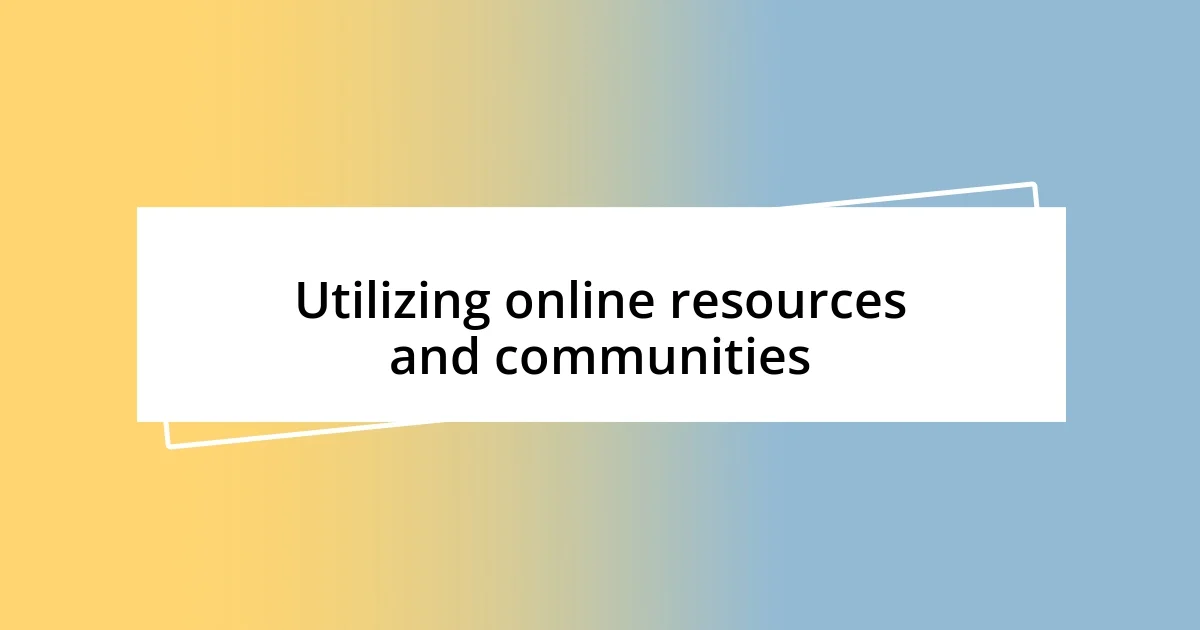
Utilizing online resources and communities
Utilizing online resources and communities can elevate your coding journey in ways you might not expect. When I first started exploring Stack Overflow, I felt like I’d stumbled upon a treasure trove of knowledge. The way seasoned developers generously shared their insights blew me away. Have you ever had a question that seemed impossible to figure out, only to discover a detailed answer waiting for you online? That sense of relief can be incredibly motivating.
Being part of a coding community on platforms like GitHub taught me the value of collaboration. I remember contributing to an open-source project, which at first felt intimidating. Yet, receiving feedback from other contributors not only improved my skills but fostered a sense of belonging. It’s comforting to realize that you’re not alone on this path—there’s a network of individuals who genuinely want to help each other succeed. Take it from me, finding your tribe can make learning so much more enjoyable.
Finally, I can’t emphasize enough the importance of online courses and tutorials. When I first dived into web development, I enrolled in a free online course that broke everything down into manageable steps. It felt like having a personal mentor guiding me through the intricacies of HTML and CSS. The sense of accomplishment after completing each lesson kept me inspired to push further, proving that structured resources can transform learning into a rewarding experience. Have you tried using online platforms to enhance your skills? If not, you might be surprised at what you can achieve.
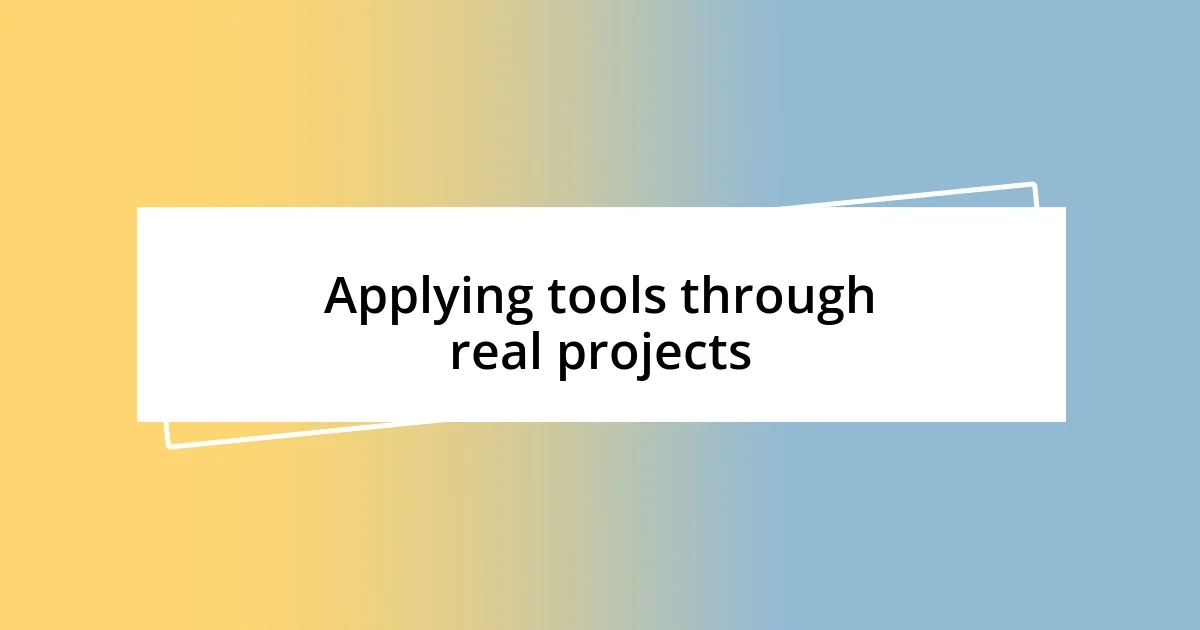
Applying tools through real projects
When I started applying coding tools to real projects, the experience was eye-opening. I remember building a simple portfolio website, bringing everything I had researched and learned about HTML, CSS, and JavaScript into a cohesive final product. The thrill of seeing my work come to life made all those late-night coding sessions worth it. Have you ever built something from scratch and felt that wave of pride wash over you? That’s the moment I live for.
Working on real projects also gave me the chance to face genuine challenges. Take my experience with implementing a contact form using PHP; I encountered errors that left me scratching my head for days. However, troubleshooting those issues taught me more than any tutorial possibly could. It’s as if I was solving a puzzle, each breakthrough a mini-celebration. Each challenge reinforced the idea that practical application deepens understanding far more than theoretical knowledge ever could.
Applying tools in real projects taught me the value of iteration. Once, in a group project, we decided to revamp a client’s website, and our initial designs were far from perfect. The feedback loop—design, test, and revise—was exhausting yet exhilarating. It fostered a collaborative spirit, melding each team member’s strengths into a final product that truly resonated with the client. Can you imagine the satisfaction of collaborating and then witnessing the client’s joy? There’s nothing quite like it, which is why I continually seek out projects where I can apply my skills and learn from real-world scenarios.
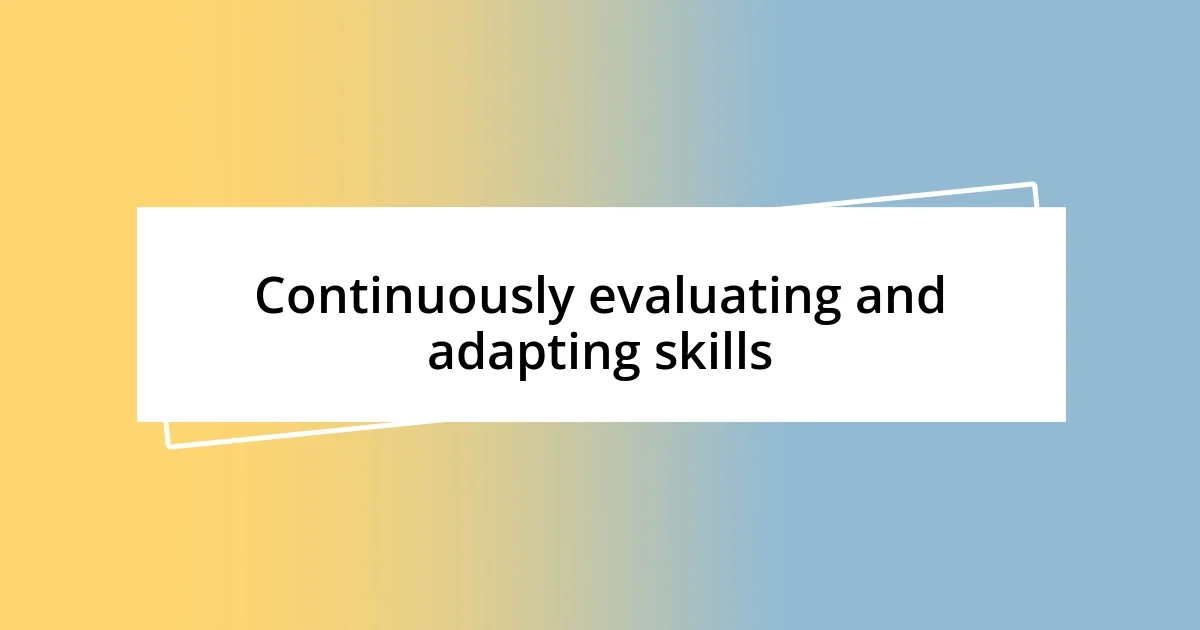
Continuously evaluating and adapting skills
Continuously evaluating and adapting my coding skills has been crucial in my journey. I often reflect on my progress by asking myself if I’m truly pushing my boundaries or just skimming the surface. For instance, I recall when I shifted from basic JavaScript to learning frameworks like React. The learning curve was steep, but I embraced the challenge. Have you ever set a goal that felt daunting but ultimately rewarding? That’s how I feel each time I step outside my comfort zone.
Keeping up with the rapidly evolving tech landscape is essential, too. I remember attending a local tech meet-up where an industry expert talked about emerging tools. Initially, I felt overwhelmed by the sheer volume of information. But, I realized that embracing these shifts meant continuously refining my toolkit. It’s as if I’m a baker, always experimenting with new ingredients to enhance my recipes. Isn’t it exciting to think about how each skill can elevate your work even further?
Lastly, I believe the feedback I receive plays a vital role in my self-evaluation process. I actively seek critiques from peers on my projects and coding practices. Once, a fellow developer pointed out a more efficient way to structure my code. While I felt a twinge of vulnerability, I quickly recognized that this feedback was an opportunity for growth. Have you ever turned criticism into a stepping stone for improvement? That moment taught me that being open to change not only hones my skills but also cultivates resilience in the face of challenges.



